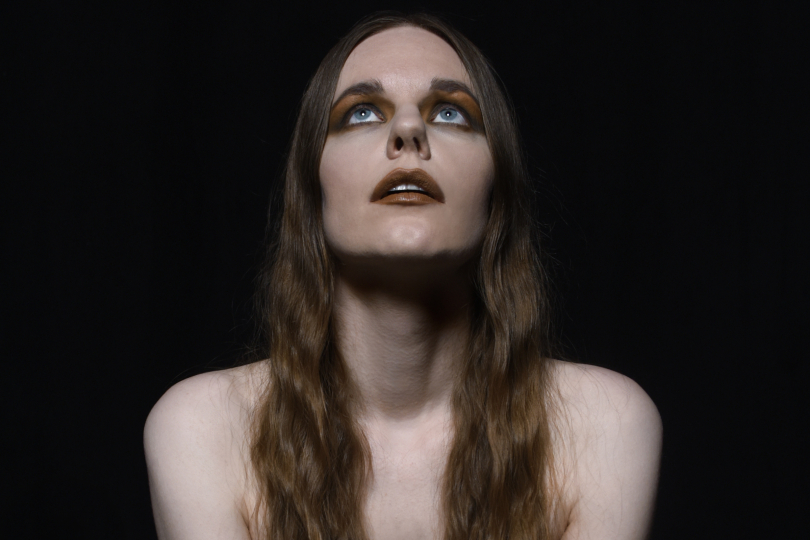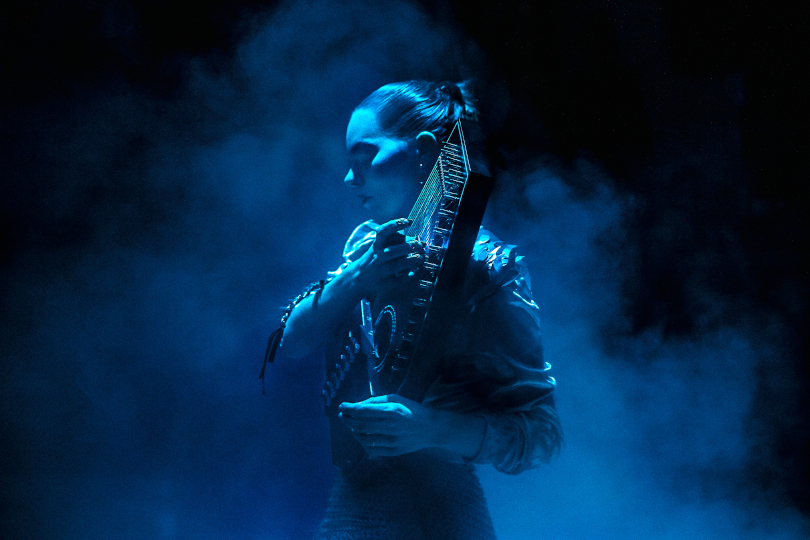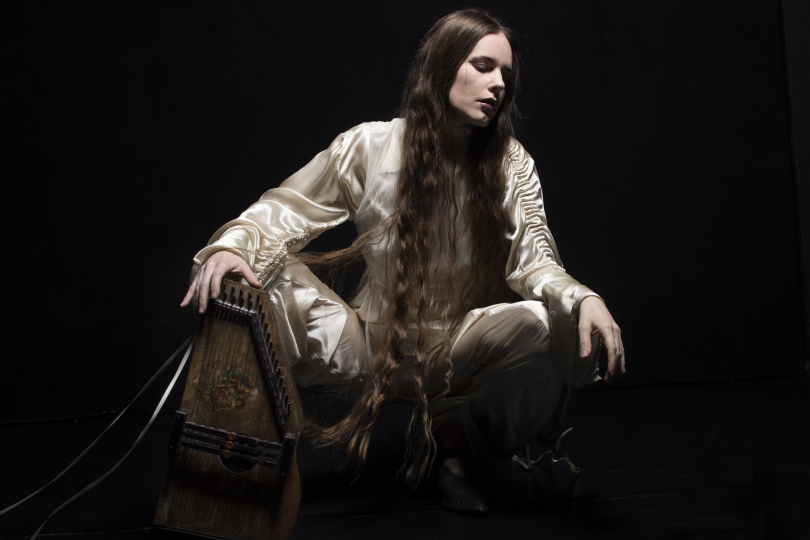
Petra Hermanova: Berlin Is an Island Where Many Artists Like to Get Shipwrecked
A graduate of the Faculty of Fine Arts in Brno, Petra Hermanova, has been bouncing between fine art and music since her studies. As a visual artist, she has made music videos (for example for the band Khoiba and Sin Malditu) and animations. She has been a professional musician since 2008, when she co-founded the Czech-Norwegian indie band Fiordmoss, which has toured Europe and supported Midi Lidi, released three recordings and won the Anděl Award in the electronics category for its album Kingdom Come. After the break-up of Fiordmoss, Petra Hermanova, as its Berlin-based singer and songwriter, claimed the spotlight with the extraordinary solo album In Death's Eyes, rightfully nominated for the Vinyl Award as Record of the Year 2023. The record also received a nomination in the Apollo Awards and features in the pre-nominations of the Anděl Awards in the Alternative and Electronica category.
After the break-up of Fiordmoss, you sidelined music for as many as five years. What brought you back?
It's true, for a while I was only making music in my private life. The return was slow and subtle. I was brought back to the scene by my musical friends through invitations to collaborate on albums or concerts. I found out that there were people who wished I would get back into music. That interest gave my return to music a sense of purpose.
Fiordmoss were not a band that would just fleetingly appear on the scene – in 2012 they won the first-ever Vinyl Award and six years later they even won the Anděl Award. Why did the band fall silent? And did it end for good or is there a chance of a comeback?
We were fully dedicated to the band for almost a decade. But we couldn't do it indefinitely with such intensity and at the expense of all other areas of life. Even though we are all utter romantics, this was our problem for a long time – and ultimately the reason we had to quit. But currently, we continue to support each other on our separate journeys.
On your debut solo album In Death's Eyes, you deal with the death of one of your loved ones – your dad. Was songwriting in some ways a cathartic process for you?
I don't know if catharsis is quite the right word. It was a difficult process for me, existential and intimate, quite often a struggle. But writing music as such could distract me from the raw reality of life, at least for a while – and I was glad for that.
You recorded the album with organist Denny Wilk in the cathedral in Merseburg, Germany. How did you find this particular place and how did it make you feel to hear your music in such an impressive space?
Hearing the songs in Merseburg Cathedral was definitely one of the most precious moments of the whole album process. It was a completely surreal moment. Apart from myself, three other friends attended the recording session and helped in various ways during the recording process, so it was a kind of communal experience. You could tell it was unique to everyone present.
Merseburg was chosen because of the personal connection Denny Wilke has to this particular church. Denny serves as assistant organist at the cathedral and knows the Merseburg organ intimately. He also took us inside and told us stories about the history of the instrument. It was apparent that he had spent a lot of time in the cathedral and I think that deep knowledge is reflected in the recording.

How did you get to the zither or autoharp with which you recorded the album? What brought you to such an unusual instrument?
I got to it quite easily. I wanted to play a stringed instrument and the guitar was not an option for me because of my hand problems. I was thinking about the autoharp for quite a long time, but it wasn't until the end of Fiordmoss that I found a place for it in my life.
What is it about the autoharp that attracts you and that you enjoy – is it the sound, the technique, the history of the instrument? And how many chord zithers do you own?
Six now, each in a different condition. Three of them are used on the record, and I usually take two to concerts. The autoharp is such an unpredictable element for me, full of contradictions, at first glance it's a completely primitive instrument, but it takes a while to get something decent out of it. It can sound strange, almost angelic, but at other times it's just like a wooden box with strings. It's a very limited instrument, which tempts me to push its boundaries somehow.
When you say autoharp, PJ Harvey fans immediately think of the album Let England Shake. Do you like that record? And do you know of any other albums by contemporary musicians that make this instrument "speak"?
Let England Shake is definitely a great album. Partly because the autoharp isn't there just as a prop, which is unfortunately its usual fate outside of the scene where it's normally used. For that reason, I have to mention musicians who have been autoharping their whole lives. These include Jo Ann Smith, Bryan Bowers, Karen Mueller and Bob Lewis.
The album In Death's Eyes seems to transport the listener to centuries long ago, it is extremely impressive, though perhaps too dark for some. How would you describe the album in terms of mood and atmosphere?
I approached the creation of the album quite intuitively. In the beginning, I had no idea how the album should sound. The only guide was the nine themes I needed to address, and I recorded the songs as they came. It wasn't until they were all written and recorded that I started to realise what kind of a whole they made and wondered if they would even work together.
I think the record is an honest guide to a destabilising experience and reflects many layers – love, fragility, pain, vulnerability, surrender, and then, of course, the existential dread of a disrupted reality. It is exactly what the moment called for.

You have lived in Berlin for more than ten years, a city known for its very strong and multicultural artistic community. Is it the perfect environment for artistic creation, or are you staying in Germany for other reasons?
I rather say that I live in Berlin and not in Germany. Berlin is quite a specific place that may exist within German society, but it gives the impression of an island. A lot of people end up shipwrecked here in a positive sense. They come and they stay because they feel like there is nowhere else to go where the possibilities of artistic life meet the chance to earn a living and also some social values. But this is also changing all the time, and it's certainly more complicated now than it was, say, ten years ago.
You also got married in Berlin. Your husband is not German, but Norwegian, drummer and producer Jon Eirik Boska, known from Fiordmoss. You have collaborated on a number of projects, such as the Ourobora exhibition at the gallery in your hometown of Valašské Meziříčí. Do you still collaborate?
We had met before we moved to Berlin, which suited both of us. Our joint creative activity has changed many times over the years – both formally and artistically. I guess it just happens that even when one of us starts a solo project, sooner or later the other one gets involved in some way, even if only marginally.
Do you have any idea how your artistic life will develop – will music dominate again, or will you pursue it alongside visual art? Do you have any other musical plans – maybe even concert plans, in the context of the live performance of In Death's Eyes?
I've spent almost two years working on the album, so my focus now is solely on how I can best get the album out to the audience. It's the biggest project for me so far, so I'm not going anywhere else for now and I'm mostly thinking about touring and how the record can work in different contexts despite its diversity. I'm most interested in performing the record live with an organ, especially in a venue that already has such an instrument. This brings new challenges and musical possibilities.
For example, in the autumn I worked on the music for a film that should appear at festivals this year. In addition, I have been selected for this season by SHAPE+, which is an initiative for European innovative music and audiovisual arts, so I will be doing a residency and related activities. I have temporarily stopped my animation work, which I did in between the band and my solo album. I felt that it had run its course for me.
What will your concert set look like at the Vinyl Awards? What can listeners look forward to on 6 March at Lucerna Music Bar?
For this occasion, I will bring a more minimalist set with a drummer. This set focuses more on the songs themselves, which sometimes collapse into drones and soundscapes. I'll be playing as a duo with Jon Eirik, with whom we already presented this version of In Death's Eyes at the Insomnia festival in northern Norway.
How often do you return to the Czech Republic? And is there anything you miss from your homeland?
In the period when I didn't play concerts in the Czech Republic, I came less, maybe two or three times a year. But now I think it will change again and I will come more often. And if I miss something in Berlin? Well, we live in an apartment, so apart from my family I miss nature the most. And the frgals! (a traditional Moravian cake, ed.)
If you have found an error or typo in the article, please let us know by e-mail info@insounder.org.

